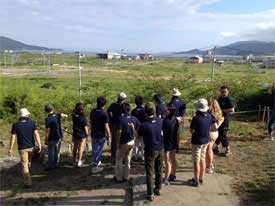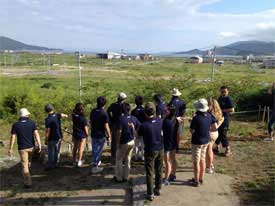 KINGSTON, R.I. – August 31, 2012 – A group of University of Rhode Island students and faculty spent 10 days in Iwate Prefecture, Japan this month learning first-hand about the 2011 earthquake and tsunami and working on class projects aimed at helping the communities recover.
KINGSTON, R.I. – August 31, 2012 – A group of University of Rhode Island students and faculty spent 10 days in Iwate Prefecture, Japan this month learning first-hand about the 2011 earthquake and tsunami and working on class projects aimed at helping the communities recover.
The three-credit class, taught by three URI professors along with professors and students from the University of Tokyo, is the result of a memorandum of understanding signed in May by the two universities to offer summer courses on coastal management. The course location will alternate each year between Rhode Island and Japan.
“The course was designed to provide an interdisciplinary and international perspective on coastal management issues,” explained Rob Thompson, URI professor of marine affairs, who taught the course for free along with Tim George, professor of history, and Hirotsugu Uchida, assistant professor of natural resource economics. “While Japan’s building codes for earthquakes performed exceedingly well, their massive system of tsunami walls failed catastrophically. Now they’re faced with difficult decisions about what to rebuild, where to rebuild and how to rebuild.”
“They also have to figure out what to do with the flat coastal land that was cleared by the tsunami,” added Uchida, a native of Japan. “This part of Japan has more challenges because just a few hundred yards inland it is very mountainous. Any flat land is a precious thing, which is why the businesses were built along the coast, but that’s where the tsunami risk is highest, and now they’ve been wiped out. The residents can move to higher land, but what about the businesses that need to be on flat land?”
The seven URI students joined 15 Japanese students in the class and lived in traditional Japanese accommodations. Initially, a typical day included morning lectures, afternoon field trips, and evening visits to businesses and events to interact with residents. Later the students spread out to conduct fieldwork and worked late into the night on their projects.
“My group worked on a social sciences angle of the tsunami recovery, looking at the collective memory of the disaster,” said Travis Roberts, a graduate student in history from South Kingstown. “In Japan, there are ‘tsunami stones’ with warnings on them, some of them hundreds of years old. Some communities followed the guidelines and warnings closely and didn’t get harmed, while others didn’t. We looked at how to build a tsunami warning policy combining collective memory with science.”
Justin Willig, a graduate student in marine affairs from Boston, recalls feeling helpless while watching the news when the tsunami struck. So when he had the opportunity to enroll in the class and visit the area, he jumped at the opportunity.
“The destruction we saw was much larger than anything I could have imagined,” he said. “The waves destroyed everything in sight miles from the coastline.”
Willig’s class project examined fears that the Fukushima nuclear power plant may have contaminated local seafood and how to change public perception about buying seafood to help rebuild the fishing industry.
“The experience was a great opportunity to do work with people from a non-English speaking country,” said Willig. “It was difficult at first to get past the language barrier, but I learned to be patient and tried to communicate in other ways.”
Sabrina Brotons enrolled in the class to learn about a different culture and experience a different kind of learning environment. A URI political science major from the Bronx, her project focused on how to enhance ecotourism to the region affected by the tsunami.
“Every moment was a new learning experience,” she said. “But one of the most important things I learned was about mitigation and creating disaster plans. I have never been in the situation where I needed to be evacuated from my home, and I cannot imagine having all my belongings destroyed and losing loved ones. The whole experience was eye-opening.”
That was true for all of the participating URI students.
“This was a life-changing experience for me,” said Roberts. “So many aspects of it were so very powerful. Walking through one area and seeing all the shrines, I didn’t realize the level of destruction that happened. One man said to me, ‘Don’t let the people in the U.S. forget. Tell everyone about it.’ That really stuck with me.”
Pictured above
URI and Japanese students visit an area in Iwate Prefecture, Japan, to observe the 2011 tsunami damage and discuss how to help the region recover.

